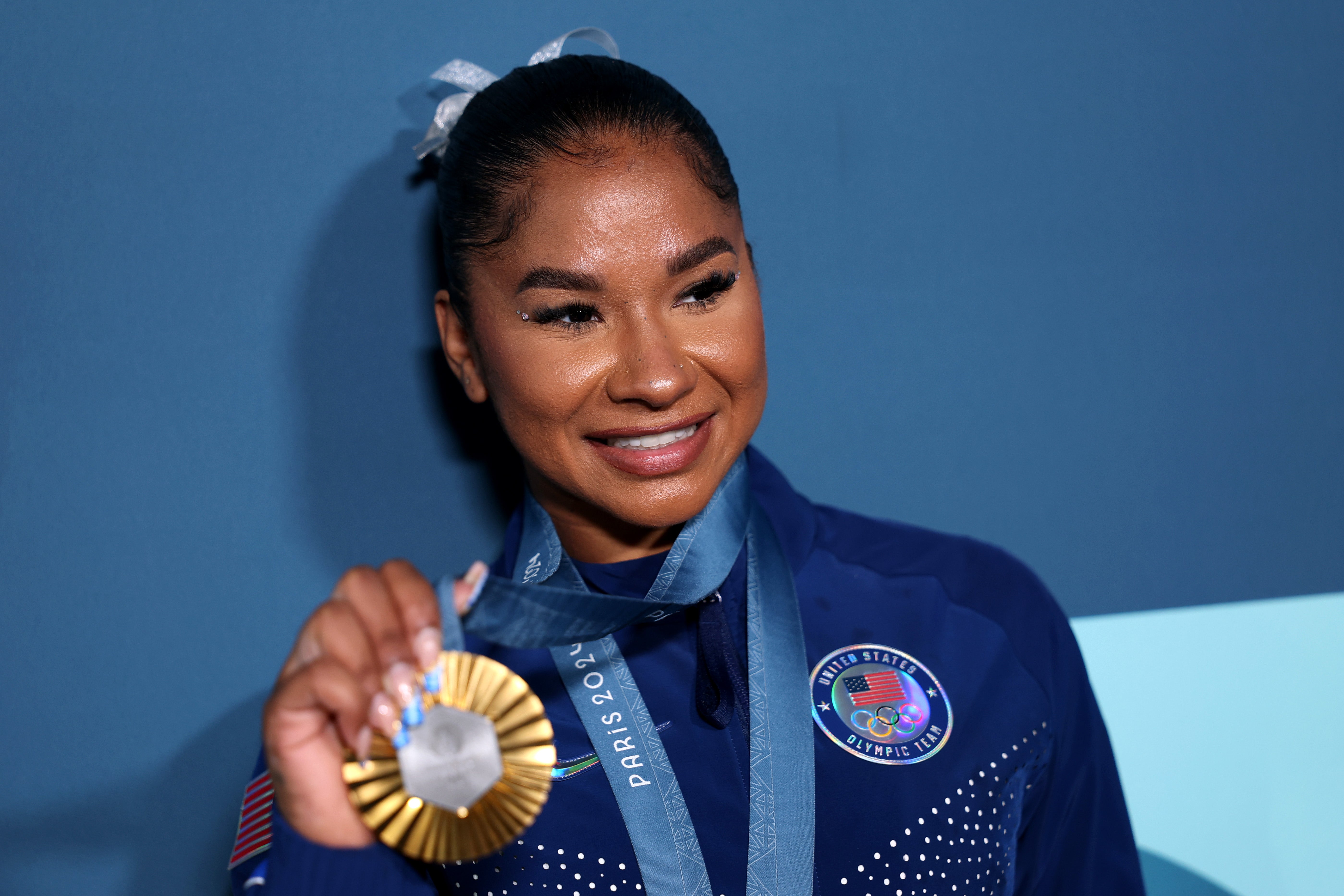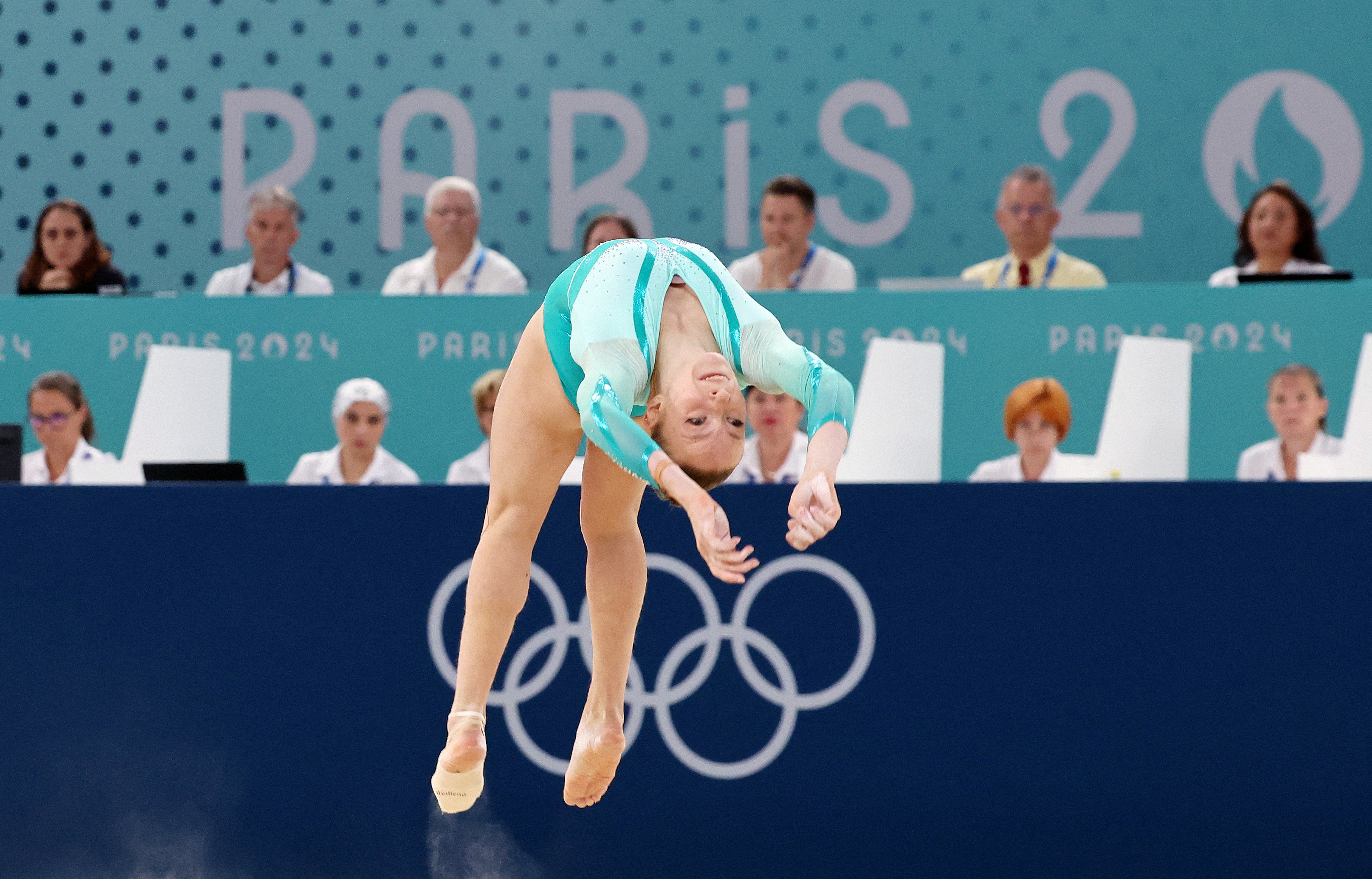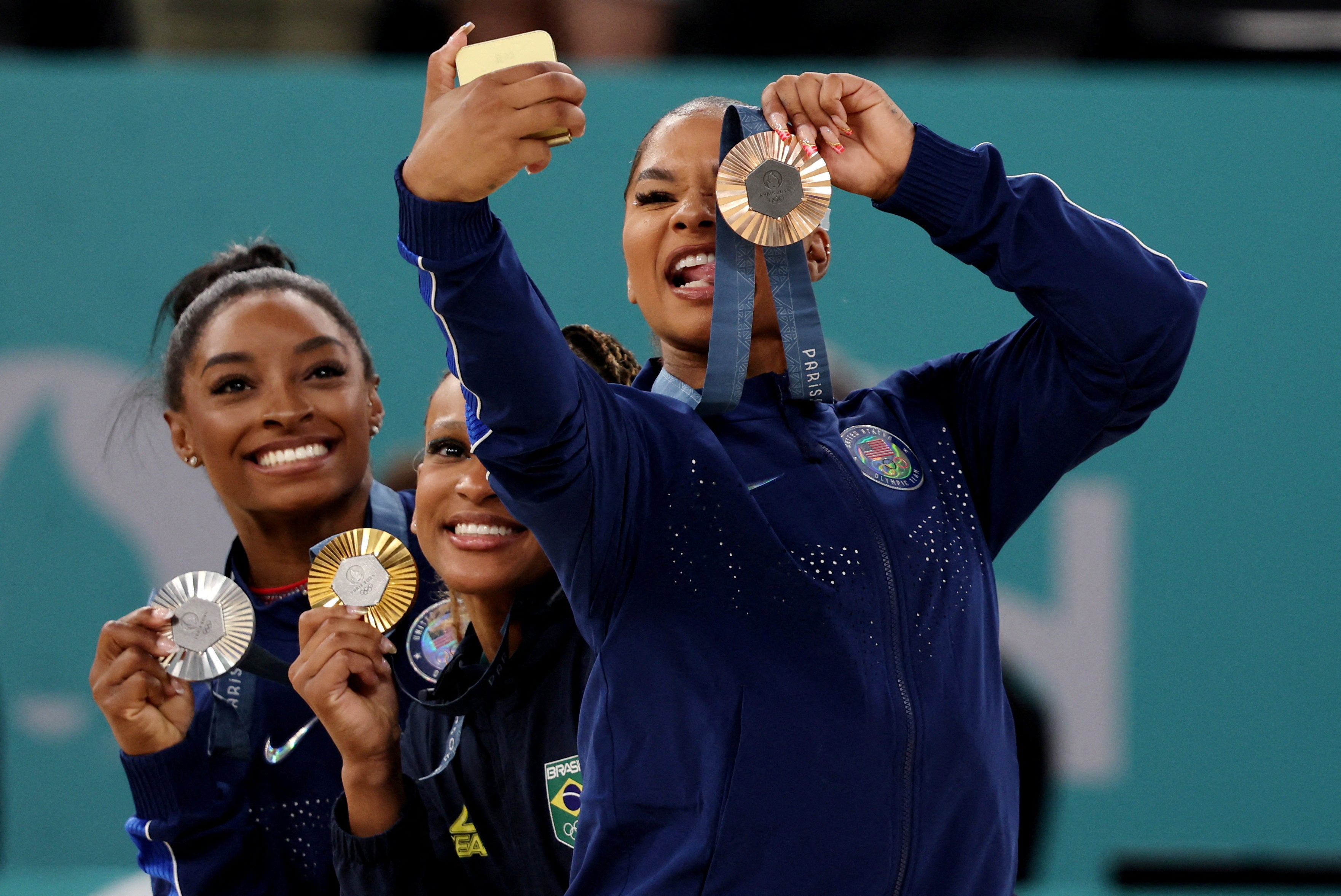The controversy around the decision to strip Team USA gymnast Jordan Chiles of her bronze medal saw a new twist on Thursday as the US says the Olympic arbitration body sent “crucial communications” to incorrect email addresses.
The dispute has been rumbling since Chiles’ floor routine on August 5 in Paris. She was first awarded fifth place but following a review of her score, was shifted up to third. Days later, the gymnast was bumped back to fifth place, forcing her to return her bronze medal.
Chiles broke her silence on the “devastating” ruling on Thursday. “This decision feels unjust and comes as a significant blow, not just to me, but to everyone who has championed my journey,” she posted on social media.
An international fight has ensued. Here’s everything we know.
What happened on August 5?
The 23-year-old American was awarded a 13.666 score after her routine, putting her in fifth place. However, Team USA Coach Cecile Landi contested Chiles’ difficulty score, and filed an inquiry to the judges. After a review, they raised her score to 13.766.
This boost pushed her over the third place score of 13.700, held by Romanian gymnast Ana Bărbosu.
After the change, a devastated Bărbosu left the arena in tears as Chiles appeared on the podium with the bronze medal around her neck. She told reporters: “This is just a dream come true…This medal means everything.”

Why did Jordan Chiles have to return her bronze medal?
Landi’s inquiry and its timing are the focal point of the controversy that ensued.
After Chiles was awarded third place, the Romanian Gymnastics Federation filed an appeal to the Court of Arbitration for Sport (CAS) — an independent body that resolves international sports disputes — claiming that the American coach filed the inquiry past the one-minute deadline.
CAS ruled on August 10 that Landi had filed the inquiry too late, therefore reinstating Chiles’ original score of 13.666, shifting her down to fifth place and moving Bărbosu up to third.
The International Olympic Committee (IOC) upheld this decision and ordered Chiles to return her bronze medal.
Not long after, Chiles posted four broken heart emojis on her Instagram story and indicated that she would be taking a break from social media for her mental health.
What happened after the initial ruling?
On August 11, the US Olympic and Paralympic Committee (USOPC) said it planned to launch an appeal.
“We firmly believe that Jordan rightfully earned the bronze medal, and there were critical errors in both the initial scoring by the International Gymnastics Federation and the subsequent CAS appeal process that need to be addressed,” USOPC said in a statement.
Also on August 11, USA Gymnastics (USAG) announced that it had “formally submitted a letter and video evidence” establishing that Landi filed the inquiry 47 seconds after the publishing of Chiles’ score — within the 1-minute deadline.
“The video footage provided was not available to USA Gymnastics prior to the tribunal’s decision and thus USAG did not have the opportunity to previously submit it,” USAG added.

What’s the latest?
On August 14, the Court of Arbitration for Sport (CAS) released its reasoning behind the decision that bumped Chiles to fifth place.
The three-person panel that made the determination “unanimous,” CAS wrote. “At the hearing, there was no dispute between the parties that Ms. Chiles’ inquiry was submitted 1 minute and 4 seconds after her score was official [sic] displayed on the scoreboard.”
“All parties accepted as clear and determinative the report prepared by Omega, the official timekeeper for the Olympic Games, and submitted by the FIG itself. No party sought the admittance of other evidence,” CAS continued.
This statement conflicts with claims from USAG, which said it had submitted time-stamped video showing that Landi filed the inquiry well within the time limit.
In a statement to The Independent on August 15, the US Olympic and Paralympic Committee similarly said it “strongly contests” the arbitrator body’s ruling “due to significant procedural errors”.

The committee said that information had been to the wrong email addresses.
“From August 6-9, CAS sent crucial communications to erroneous email addresses at USOPC and USAG, an error not corrected until August 9—three days after filing, two days past the deadline to submit objections, and less than 24 hours before the hearing,” USOPC said.
“This deprived us of adequate time to respond meaningfully or gather necessary evidence. We informed CAS of our objections immediately.”
USA Gymnastics also said that the international arbitrators had sent “case filings to incorrect email addresses.”
The American organizations said they will pursue an appeal.
Chiles breaks her silence
On Thursday, one day after CAS explained its reasoning behind its decision, Chiles broke her silence.
The gymnast said she has been “overwhelmed by the love I have received over the past few days” and is “incredibly grateful” for the support from her family, coaches, fans, and the US athletic organizations.
“While celebrating my Olympic accomplishments, I heard the devastating news that my bronze medal had been stripped away. I had confidence in the appeal brought by USAG, who gave conclusive evidence that my score followed all the rules. This appeal was unsuccessful,” she posted on X.
“I have no words. This decision feels unjust and comes as a significant blow, not just to me, but to everyone who has championed my journey.”
Being stripped of a bronze medal wasn’t the only adversity she has faced in recent weeks, Chiles said.
“To add to the heartbreak, the unprompted racially driven attacks on social media are wrong and extremely hurtful. I’ve poured my heart and soul into this sport and I am so proud to represent my culture and my country,” she wrote. The gymnast has spoken openly about the racism she has faced while competing in the predominantly white sport.
“I am now confronted with one of the most challenging moments of my career. Believe me when I say I have had many,” Chiles continued, adding that she remains hopeful that “at the end of this journey, the people in control will do the right thing.”
What is the alleged ‘conflict of interest’?
On top of all the other drama, CAS’s decision is under fire for yet another reason: one of its panelists.
The head of its three-person arbitration panel, Hamid Gharavi, has represented Romania in international legal disputes for over a decade, documents show.
Gharavi currently serves as legal counsel to Romania in its disputes before the World Bank’s International Centre for the Settlement of Investment Disputes, according to an article by the nonprofit The International Institute for Conflict Resolution and Prevention, which first reported the revelation.
Gharavi’s bio on CAS’s website also reveals his years of experience representing Romania. The nonprofit argued that Gharavi’s presence on the panel could be a conflict of interest, since Chiles’ place was ultimately bumped in favor of a Romanian gymnast.
“The issue is whether an Olympic arbitrator who currently represents a country on the global stage can decide a case involving a gymnast of that country, in an unbiased manner,” the International Institute for Conflict Resolution and Prevention said.
“Is it realistic to expect such [an] arbitrator can decide against the interests of that country or of that country’s gymnast, who in this case is represented by the Federation of Romanian Gymnasts?”

Gharavi told The Independent that he was not allowed to comment on matters related to his role as arbitrator in this or any other case.
In its Wednesday release, CAS wrote that the panel’s composition “was not objected to or challenged by any of the parties or interested parties.” CAS also said it had sent a “written statement” disclosing Gharavi’s legal representation of Romania along with a notice of his appointment.
After the allegations about Gharavi were published, on Wednesday, CAS said it “condemns the outrageous statements published in certain US media” alleging that the panel — and particularly Gharavi — “was biased due to other professional engagements or for reasons of nationality.”
Since no party challenged any of the panelists, “it can reasonably be assumed that all parties were satisfied to have their case heard by this Panel. Any subsequent criticism is without foundation or merit,” CAS said.
However, USAG on Thursday told The Independent in its statement that “CAS did not send the conflict-of-interest disclosures of any panelist to USA Gymnastics, nor have we seen the disclosures to date.”









![Best Weight Loss Supplements [2022-23] New Reports!](https://technologytangle.com/wp-content/uploads/2022/12/p1-1170962-1670840878.png)




